Me and My Piano
By Don Robertson (2000)
Original title “My Piano and I”. Footnotes and photos were added in 2022.
I have had a long affair with my piano, albeit on and off. It began in 1944 when I was just a child of two years, and classical music was my first love, the most meaningful thing in my life. I was born and raised in Denver, Colorado at 45 Dahlia Street (later renumbered 39 Dahlia Street).
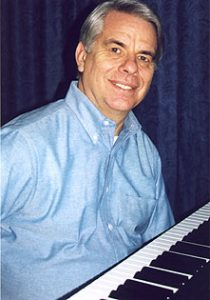

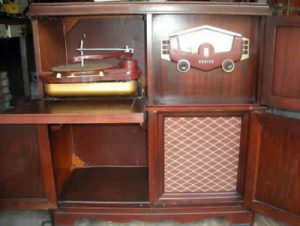
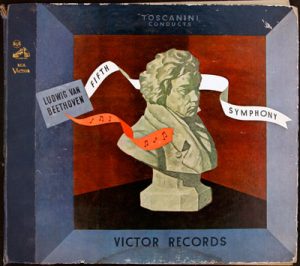
Mom and Dad had a huge wooden Zenith console radio-phonograph in their front room. It was a big, stained and polished wooden affair, with a 78rpm record changer. On the front of the big unit was an old-fashion AM radio receiver, below that was where the large speaker resided. Mom and Dad owned probably a dozen classical records that I had discovered when I was two, and I played them over and over. My favorite was the 78-rpm record album of Beethoven’s Fifth Symphony conducted by the famous Italian conductor, Arturo Toscanini.
One day during the following year, the wife of former Colorado Senator Lawrence Phipps[1] was visiting my parents. She was a patroness of the arts. Mom told her about my interest in classical music. She encouraged my mother to take me to a very special lady, Dr. Antonia Brico.
[1] Lawrence Cowle Phipps (August 30, 1862 – March 1, 1958) was a United States Senator representing Colorado from 1919 until 1931. His wife was Margaret Phipps
Dr. Brico
Dr. Brico was one of the World’s first woman conductors. She was famous for having been the first woman to conduct the New York Philharmonic Orchestra. During the year that I was born, 1942, she had moved to Denver, as she had been invited to become the permanent conductor for the Denver Symphony Orchestra.
She had purchased a home and had moved her belongings to Denver, including the two grand pianos that she used for her livelihood of teaching piano students.
Soon, the members of the Denver’s elitist, male only Cactus Club found out that the symphony had hired a woman for a conductor, and they saw to it that she would never be able to take the job. There she was in Denver with her two grand pianos, and without her position as conductor of the Denver Symphony Orchestra.
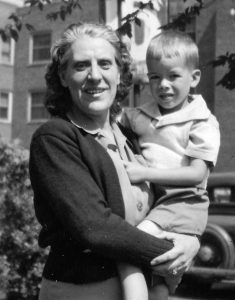
She came from a tremendous background in Europe, performing and conducting, and had become friends with many of the finest European and New York classical musicians, conductors, and composers. It was well known that she was a very demanding person, and that she only took students that she believed in.[1]
Mrs. Phipps gave Mom her phone number and Mom made an appointment for the following day. Mom drove me over to Dr. Brico’s house. I was only three years old.
I fell instantly in love with Dr. Brico. Her front room was where she had set up her pianos. Everything in the room was about music. The walls were filled with photographs of famous European musicians, composers and other personalities. Many were signed: “To my beloved Antonia, Queen Juliana of the Netherlands,” “To Antonia with love, Albert [Schweitzer].” There were letters from famous composers and musicians and many wonderful musical knickknacks and books.
“He is too young. I don’t accept anyone younger than five!” she told my mother assertively. However, after mom told her more about my love of classical music, she changed her mind, and I began coming to her house for lessons.
I became very close to Dr. Brico. Going to her house was the highpoint of my life. Being so very young, there wasn’t much that she could actually teach me, but I remember sitting at her piano with the keyboard lid pulled down, covering the keys, and I practiced lifting my fingers slowly up and down.
I felt completely at home sitting beside her at the piano and learning about music. It seemed to me that this was the way it was supposed to be.
She had a piece of white cardboard with a musical staff printed on it. A musical note attached to a string slid up and down on the staff. After she placed the note somewhere on the staff, I had to tell her what the name of the note was. I was good at that.
I loved learning about the notes and wanted to know how all the notes fit together to make a symphony. But I was still too young to manipulate my fingers directly on the keys of her grand piano.
“When your fingers are stronger, I will open the keyboard and start teaching you how to play the keys themselves.”
[1] There are two wonderful films about the Dutch-born conductor, Antonia Brico, and I highly recommend both of them. The first is Judy Collins’ 1974 oscar-nominated documentary Antonia: A Portrait of the Woman, and the second is the 2018 film The Conductor starring the Dutch actress Christanne de Bruijn. Those films are here
Jean Sibelius
The following summer, 1946, Dr. Brico was leaving for a trip across the sea to visit her friends, among them the very great Finnish composer Jean Sibelius, and the famous Dr. Albert Schweitzer who lived in Africa. She asked Mom to take a couple of pictures of her holding me in her arms. She was going to give these pictures to Mr. Sibelius.
“This boy will be a great composer someday,” she told my mother.
When she returned from her visit abroad, she brought me a little hat that she had purchased for me in Sibelius’ hometown in Finland.
Meanwhile, my father was becoming anxious about my piano studies with Dr. Brico.
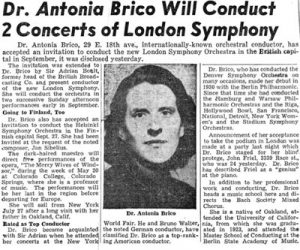
He was a young lawyer, from a prominent Denver family, and was following his own father’s footsteps.[1] Then, and never in his entire life, would he ever accept music as an acceptable or appropriate pursuit for someone to engage in. If you didn’t become a successful businessman, politician, lawyer, or surgeon, you were pretty much finished in life as far as he was concerned.
“She’ll turn him into a goddamn prodigy!” he complained, convinced that Dr. Brico would ruin me, that she would use her strong personality to mold me into some sort of strange creature. She would prevent me from becoming “normal.”
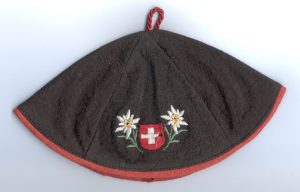
And so my lessons with Dr. Brico were abruptly terminated. The effect of this was not unlike an anvil being dropped on my head. I mourned the loss, and I missed Dr. Brico incredibly. I brooded and dreamed of that house, and about her. I could close my eyes and see the walls on which hung the photos of orchestras, of old, shiny and worn violins and cellos, and the narrow, black shapes of clarinets with their sparking keys, and the oboes, bassoons and cellos. I continued to beg my mother to let me return to my lessons, but it was over.[2]
[1] My grandfather, Howard S. Robertson, was the president of the Denver Tramway Company: the company that ran all of the buses and streetcars in Denver.
[2] My father came to visit me and my family in 1983, when we lived in Santa Rosa, California. Meanwhile, Antonia was taking the healing waters at nearby Calistoga Hot Springs and was coming to our house for dinner. I was concerned about some kind of clash with my father who had been drinking heavily and calling her “babe”. But dad was being playful. She told me when I drove her back to her hotel that she thought he was just great. Folk singer Judy Collins writes affectionately of her own studies with Antonia Brico in her autobiography Trust Your Heart.
Life Continues Anyway
I continued playing records and listening to my radio, however. There were numerous broadcasts of musicals and classical shows broadcast on radio, and I loved popular music also. My favorite shows were the Longeen-Whitnaur Show that featured classical music every Sunday and Live from the Metropolitan Opera on Saturday. In 1949, Grandmother Robertson, whom I called Granna, bought me a 45-rpm record changer and a stack of RCA Victor classical records. This was when the first 45-rpm records were released, and I was among the first to have a player in Denver. The following year, my father bought me an Eicor tape recorder, with which I could record my favorite radio music. It was a 1/4-inch tape machine that recorded on gray paper tape.
I had a secret. I composed orchestral music in my head, and then tried to hum it. I was able hum in a way that to me sounded like an orchestra. I made up operas and symphonies, humming them as I composed them in my head, changing the tone of my hum for the sweetness of violins, or the power of brass. I knew that this was considered to be pretty strange behavior, and so I was very careful to conceal it. One time, however, I was at my Grandmother Schlenzig’s home, sitting on the toilet, humming away, making my orchestral sounds: thick sounds for the brass, the sweet high soars of the flutes, the crash of the cymbals, and the full orchestral tutti. Suddenly I looked up and discovered my perplexed grandmother standing at the door, watching me, wondering what in the world I was doing.
“You had better stop making noises like that or you won’t be able to sing like Perry Como when you grow up,” she said.
Music was my life. I really had only one other interest, and that was Denver’s streetcars. Grandpa Robertson was the president of the Denver Tramway Corporation, Denver’s streetcar and bus company.
He and Granna took my family out to dinner at the Lakewood Country Club every other Sunday or so and Grandpa and Granna always stopped to watch the interurbans pass at the DeVinny Station. Grandpa always arrived at the right time because he knew all the schedules for every streetcar line in Denver.[1]
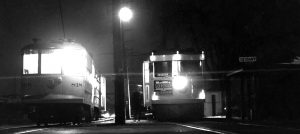
[1] Later, when I was 15 years old and the streetcars were gone, Dad told me the Tramway Corporation was getting rid of all of their old records and photographs, and so I rescued what I could, and starting with an 8X10 notebook, began copying historical information from the rescued records. This eventually will become my three-volume tome Denver’s Street Railways.
I Get a Piano
While most of my family did not understand my preoccupation with music and streetcars, my grandmother Robertson was always supportive. She owned an old upright piano that no one played. One day when I was about nine years old, she had it moved into the basement of my house at 45 Dahlia Street in Denver. It was mine!
The joy that I felt when this great instrument arrived was overwhelming. Immediately, I started trying to play. However, I didn’t know enough to really start: Dr. Brico hadn’t gotten that far with me. At the time, my parents had a live-in maid. She knew a tiny bit of piano and helped me a little bit, showing me how to play the first few bars of a very simple piece called Minuet in G.[1]
I begged my mom to let me return to Dr. Brico. Finally, after a long period, Mom told me that I could take piano lessons again, but not with Antonia Brico; it would have to be with someone else. They picked out someone for me to study with. It would be “Mrs. Nagasteen.”
[1] The Minuet in G, Op. 14/1 is a short piano composition by Ignacy Jan Paderewski that became world-famous, overshadowing his more major works such as the Symphony in B minor “Polonia”, the Piano Concerto in A minor, and the opera Manru. (Wikipedia)
Mrs. Nagasteen
Mrs. Nagasteen[1] turned out to be a young lady who was married to a short, dark, brooding fellow from the Middle East. Mrs. Nagasteen gave me boring little pieces that I was supposed to practice every night, but I hated these atrocities. Instead, I wrote my own pieces, hunting out the notes on my grandmother’s piano and carefully writing them in my little manuscript books.
I would go to my lesson and sit at the piano next to Mrs. Nagasteen. She always looked ahead seriously, avoiding any real exchange with me, and asked me to play my assignment. When I told her that I could not, her face would become long and disappointed.
“You have not practiced; you are not learning your assignments. You will not get anywhere if you do not practice.”
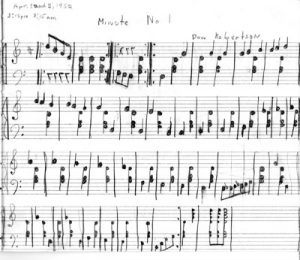
Her house was cold and dark, not bright and alive like Dr. Brico’s home. Sometimes Mrs. Nagasteen’s husband would come in the front door while I was sitting at the piano looking down at my shoes while Mrs. Nagasteen scolded me. He would slide furtively across the hallway headed for somewhere in the back of the house, dark, like some Aladdin-like creature spiriting away a magic lamp or some wonder from Ali Baba and the Forty Thieves.
Soon after my lessons started, I spotted a boxed-set of 78-rpm records on the top shelf of the bookcase next to Mrs. Nagasteen’s piano. It was Toscanini conducting Beethoven’s Ninth Symphony! The only Beethoven symphony that I had known was the Fifth Symphony. I was so happy to discover these records, and I wanted more than anything to listen to them.
“Please Mrs. Nagasteen, can I listen to Beethoven’s Ninth Symphony? Just once.”
“No! You do not practice your lessons” she would scold me. It always seemed to me that her face was like a blank sheet, expressionless and cold. She was not going to let me listen to that symphony. It was as if this was her ultimate punishment for my stupidity and lack of effort.
One day when I was waiting in Mrs. Nagasteen’s front room for my mother to pick me up after a lesson, Mrs. Nagastein let me listen to another treasure that I had found in her record cabinet in the adjoining room. I guess she figured it would keep me distracted while she was with another student. What I had discovered was a set of records called the “Seashore tests”. These were used for determining someone’s ability to distinguish the various pitches.
“OK, you can listen to them,” she conceded.
On the records, a pitch was played, followed by another pitch that was only slightly higher or lower than the previous one. You had to be able to distinguish between these pitches, to determine if they were the same and if not: which one was higher than the other. There were a number of examples on each record. I discovered that I could easily tell the differences in pitches, and this caused me to realize that since these tests had been made to determine such an ability in a person, that probably not everyone else could tell the difference in pitches as easily I could. This new knowledge gave me confidence. I knew that music was my life, even though it wasn’t happening with Mrs. Nagasteen.
My lessons soon came to an end. Mom and Dad reprimanded me for wasting their time and money and told me that I could not continue with any piano lessons because I refused to practice. And so, I continued on with my life, the only music in it being my cherished phonograph records and my radio.
[1] I don’t know how her name was spelled. It was pronounced “NAH-gah-steen
The Grim Mrs. Miller
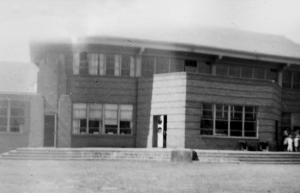
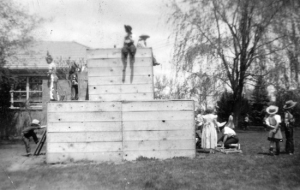
My sister and I attended a private school just four blocks from our home. It was called Grayland Country Day School. During the first, second and third grade, I spent my evenings listening to music, as I really didn’t care about my lessons at school. I wasn’t learning much there, and I had no penmanship.
Finally, in the third grade, my teacher, Mrs. Miller, came to visit my parents. She was the first of a great stream of teachers, priests, policemen and neighbors who would come to my home to discuss my various acts of misconduct and my lack of interest in school and sports.
As I secretly watched from the top of the stairs, I saw Mrs. Miller’s taught face as she related to Mom my various shortcomings: daydreamer, loaner, can’t concentrate. She told them that they must punish me because I refused to do my schoolwork. “Make him study,” she said, her face twisted as she spoke. “He has not learned his multiplications tables, and he is the only student in the class who has not.”
I knew that she hated me. Especially because one day I had brought a famous book in and showed her, in front of the entire class, a sentence that began with the word “And”. The day before, she had told us that sentences never began with “And”. I figured that she was here to get back at me. I didn’t like Mrs. Miller at all.
After she was gone, my parents walked slowly and seriously up the flight of stairs to my bedroom. I had scurried back into my room and shut the door to not let on that I had been listening. I was spoken to gravely. My infractions were fatal. My radio and record player would be taken away until I “straightened up.”
It was a tremendous shock! I had never conceived of life without music! How could I endure such a thing? I resolved never to study anything again. I was not going to give in. I hated third grade. I would not let that horrible teacher win!
The Sunny Mrs. Davlin
The days in school continued, and I was bored. I spent my spare time in the school library looking through books. One day I looked up at the top shelf and spotted one of the largest books I had ever seen. As I squinted, I made out the title: The Oxford Dictionary of Music. I was amazed! I did not know that such a book existed! I asked the school librarian, Mrs. Davlin, to take it down for me so I could look at it. Ah, but she had been talking with Mrs. Miller and she knew that I was being grounded from music until I showed some results in school.
Mrs. Davlin had a warm, round face with little, puckered lips. She was very friendly and affectionate, and I liked her very much. She looked at me and spoke sweetly.
“I will get that book down from the top shelf for you as soon as you have learned your multiplication tables.”
Ah! Now I was faced with Mrs. Miller’s bête noire: I could not multiply one number by another. In fact, I hadn’t learned addition and subtraction either, but I don’t think she knew that. My fingers worked perfectly for adding, and I had never found a need to subtract. That night, I went home and started learning my multiplication tables. Soon I not only had access to the Oxford Dictionary of Music, but my radio and record player were returned to me as well.
Dick English
The music dictionary proved to be an immense realization for me. It was filled with pictures of all the instruments of the orchestra, and I wanted to know about each one. And so, in my art class on a large piece of art paper, I began creating an intricate drawing in pencil of four orchestral instruments: a violin, a cello, a clarinet, and an oboe. I would walk back and forth between the library and the art room to check the big book, to ensure that my drawings were exactingly correct. Art class, before this time a source of infinite boredom, now had taken on new meaning. I counted the minutes until it began, then when the bell rang, I dashed into the art room to work on my picture.
One day, when class began, I took my picture down off the self where it was kept. In horror, I saw that someone had written across it in crayon with big black letters: “MARS ORCHESTRA.” With the entire class watching in astonishment, I ran from the room sobbing. Dashing down the hall, I hid in the boy’s room in one of the stalls.
I knew that Dick English had done this. My friend Rob Wilfley and I been picking on Dick English mercilessly, piteously, every day. He was a strange stick of a fellow with large protruding ears. Rob and I had a song we made up about him:
Dick English is a dope,
And has no hope to be human,
But when he turns around,
He looks like Harry Truman.
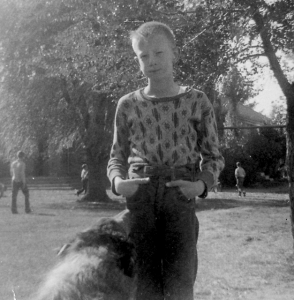
But Dick English came into the boy’s room where I had taken refuge and consoled me, apologizing profusely, explaining that he had not known what my picture had meant to me. He was truly sorry. Dick English was OK.
Seeking Out Music
My interest in music was satisfied by school trips to hear the Denver Symphony Orchestra, at that time conducted by Saul Caston. Sometimes Mom and my Aunt Dorothy would take me to Red Rocks to watch the Denver Symphony. Aunt Dorothy loved classical music. She had given me my first music books when I was 2 years old: one about the life of Beethoven and the other called Stories from the Great Metropolitan Operas. I took the (blurry) photo below:
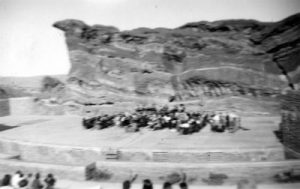
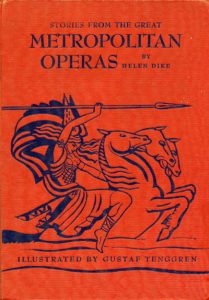
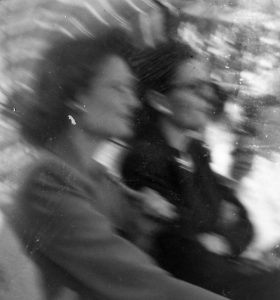
Another place that I loved to go to was the Aviation Country Club. Grandpa Robertson was a member, and we went out there often. A fellow named Eddie Young led a small combo and played music while we ate. However, I ate very little and spent every minute that I could standing next to the small bandstand, studying the combo, absorbing everything that I could about the music and the instruments.
During the summer of 1950, Mom and Dad planned a vacation in Aspen Colorado. I was 8. We stayed in a nice vacation home belonging to one of Mom and Dad’s friends.
The Aspen Summer Festival was in progress at that time. A huge tent had been set up with a grandstand seating and a large stage for orchestral performances. Mom and Dad took me there. It turned out that the Russian composer Igor Stravinsky was conducting. I knew about Stravinsky because by this time I had a record of the Firebird Suite that he had composed (Granna was still buying me records). When intermission came and Mom and Dad went outside to smoke, I scurried down to the stage and went back into the area where I had seen the orchestra players go. Back there, I had a great talk with Mr. Stravinsky.

Meanwhile, my parents had returned and immediately thought I had been kidnapped, or that I was lost or something. When the musicians came out at the end of the intermission, there came I tagging along with them. I got a good scolding for that.
Cub Scouts
In the fourth grade, Mom signed me up for Cub Scouts. Perhaps this was an effort to make me more normal. Cub scouts were normal boys who did normal things. We went to the Gano-Downs Clothing Company in downtown Denver to buy my uniform. Mom had always purchased my clothes at Gano-Downs.
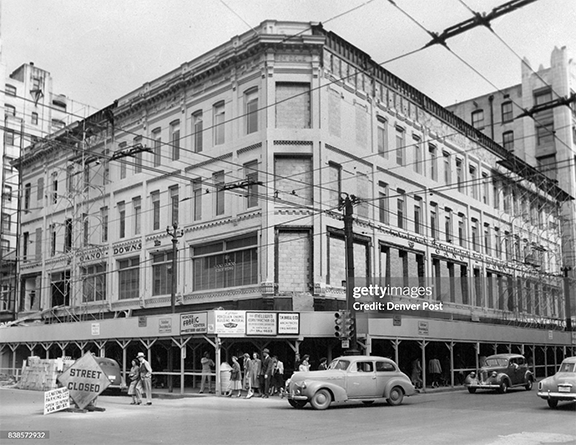
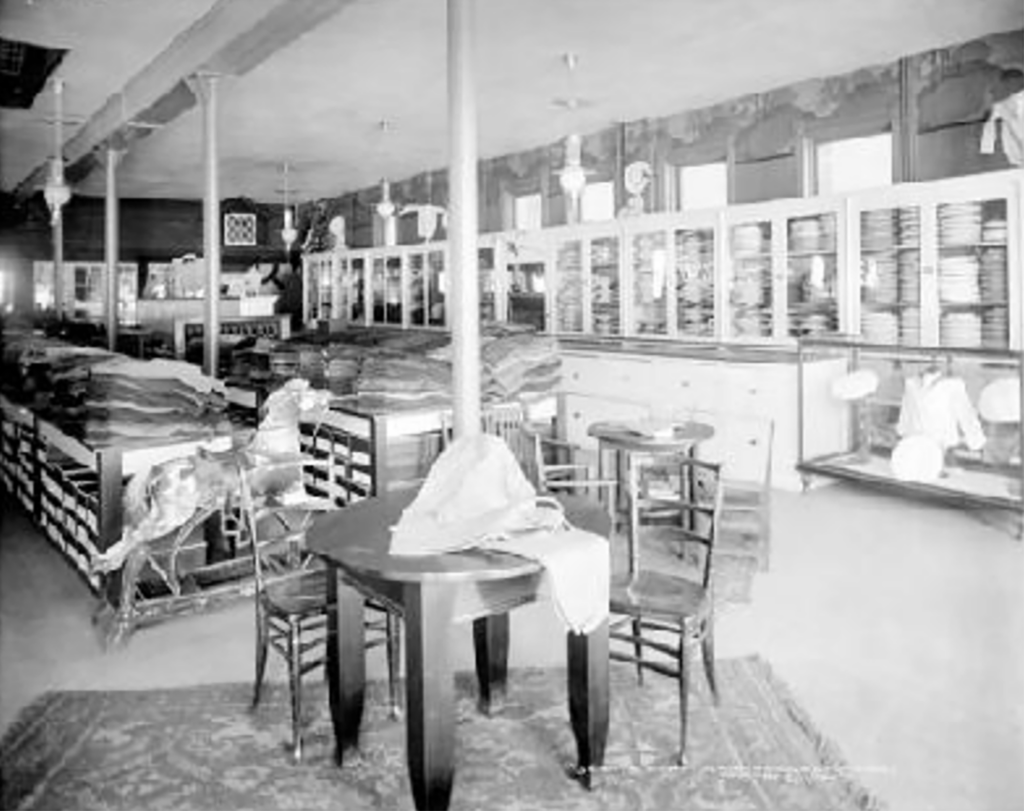
The boy’s section was on the second or third floor, and when I was really tiny, while Mom was eyeing the shiny short suit pants that I didn’t like to wear, I stood at the big corner window that overlooked Stout Street, watching the big yellow streetcars discharging and loading their passengers. We made a number of trips to Gano-Downs and I would always go over to the window to watch the streetcars. Sometimes the streets were wet with rain and other times when the streetcar started up, it made a loud, grinding noise and the pole-tip sparked on the wire.
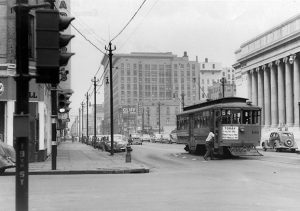
But the streetcars were gone now, and we were there for all things cub scout. There was a special scouting section where you could buy the various cloth badges that you could earn, and the books that you had to study in order to earn them.
Cub scout meetings were held at my schoolmate Jim Hart’s house. Jim Hart was a nice guy, but I wonder if he didn’t think of me as being pretty strange. Back in the 3rd grade I had been selected as his boxing partner in gym class. Chet Preiser, the gym teacher, passed out child-size boxing gloves that we were all instructed to wear, and then after lining us all up opposite our partners, he told us to start hitting. I thought boxing was really stupid, and so I just let Jim Hart pound on me. “Hit me, hit me,” Jim would say between blows to my face. I hated gym class.
During our cub scout meetings, all the scouts, dressed in our blue uniforms, were herded down into Jim’s basement where his mother gave us things to do. We made leather things mostly. I hated leather things. Upstairs, Jim’s mom and dad had a piano, so when no one was looking, I sneaked up there and worked on my little music compositions. I would enter that magic world that I loved: the world of music. There were lots of record albums in the Hart’s front room, and I liked looking through them and playing them softly, so they couldn’t be heard downstairs where the leather things were being made. After a while, Mrs. Hart would notice that I was gone and come upstairs to get me.
The Cub Scouts also made excursions, and when I went with them, I always remained back fifty or so feet from the rest of the boys, straggling behind, so they couldn’t hear me. This way I could work on my music… yes, the humming.
Dr. Goofy
In fourth grade I started writing a long story about a world of made-up beings centered around the hero, Dr. Goofy. The story just flew out of me and before long, my spiral notebook would become full, and I would need another to continue. This went on for months. I took my spiral notebook with me wherever I went, writing at friends’ homes, at the park… anywhere. I had over a dozen books filled with my story when it finally ended. But like all of the things that I loved; they soon found their way to the incinerator that we called the “ash pit” located in our “service yard.” Mom liked to “clean out” my closet every so often when I was in school, and I would arrive home after school to find treasures no longer on the shelf. I felt like it was useless trying to write these long stories, as the things that I valued always seemed to end up in the ash pit.
KDMC Radio
I continued to listen to and love classical music. By 1952, at ten, and I seriously began collecting 45 rpm records of the popular music of the day, which I also loved in addition to the classical. That year my friend Rob Wilfley and I built radio stations in our bedrooms. Radio stations, you say? Yes, radio stations.
It all started with my love affair with my radio. I loved the pop music of the early 1950s. I still believe that this was a “golden age” of popular music: a time of flowering, before the buds dropped off and the plants withered away and died, as has happened now. Rob Wilfley was still my best friend in school. His dad’s basement was a dream-world filled with interesting stuff: model trains, a photography lab, electronics. But most impressive, he had built a broadcast and recording studio. It was a hobby, and I don’t think he ever really used it. He had built a small transmitter that could broadcast over a several-block range. The instructions for building the transmitter had come from a Popular Science magazine. Rob used this transmitter to create KROB Neighborhood Radio.
I envisioned my own studio, where I could play the music that I loved, creating my own programs of music. And jointly, Rob and I with our two radio stations would create a network, The Western Broadcasting System, just like the grown ups.
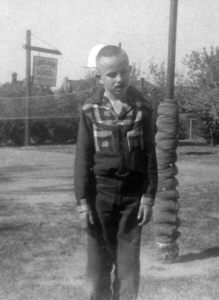
Rob’s father gave me the article from the magazine that he had used to build his transmitter. I knew nothing about electronics, but I had to have this device, so I begged my parents for the parts. Just before Christmas, my mom took me to an electronics store to purchase all of the parts that were listed in the article. This would be my Christmas present, and I was estatic. Christmas morning, I started to build the device. A month or so later, I was finished, but it didn’t work. My mom bailed me out. We took the box to a local electronics technician who worked at the transmitting tower for radio station KPOF, and he rebuilt the device for me. I brought it home, but it would need a rather long antenae. My Dad caught me on the roof of our two-story house putting up an antenna and probably nearly had heart failure. The roof of our house was very steep, and I am not sure how I managed to scale to the peak without killing myself. I was ordered down and punished.
A few days later, he told me that he had found someone who would put the antennae up on the roof if I agreed to give him my old American Flyer train set in exchange. The deal was done, and I was on the air!
In 1954 or 1955, when I was in the sixth grade, a good neighbor who enjoyed my “radio station” got me a job at a real radio station. I started out there by reading the Sunday comic strips to kids on air, but soon I had talked the station into giving me a ½ hour weekly radio show where I could play my records. The show was called “Teen Tunes.” The owner of the station did this as a gesture to my neighbor friend.
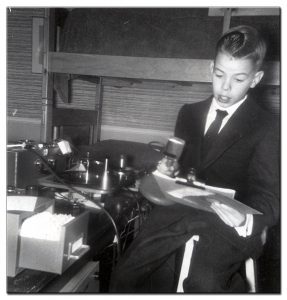
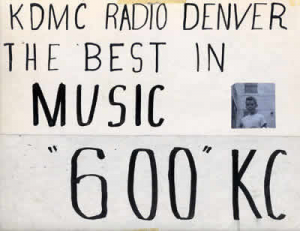
Life Goes On
Meanwhile, I still didn’t pay attention in school. Instead, I daydreamed incessantly. It was music, or it was streetcars. I had my own bus company that I had planned and laid out completely, and I shared this interest with my best friend Rob. I had elaborate maps of East Denver with routes drawn where my bus was going to go. It wasn’t going to be a streetcar since I wouldn’t be able to put tracks in the roads. I convinced Mom to buy me lumber for my birthday for me to build my bus. I labored away but didn’t know the first thing about building such a thing. One day, Dad brought rails from an abandoned mine along with a set of wheels, and a neighbor and I built a streetcar out of Mom’s lumber and laid the rails spiked to ties in our service yard. Actually, first it was a box car that my mom and I built, then the streetcar. I now had a world that I enjoyed more than that world of my daily life.
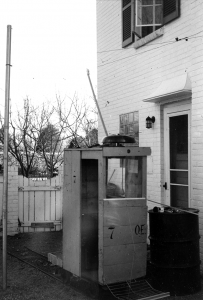
KFEL-TV
When KFEL-TV, Denver’s first television station signed on the air on July 18, 1952, it was the only station in town until 1955. For months, my always-willing Mom drove me to the KFEL-TV television studio every night after school, dropped me off, then picked me up in time for dinner. There, I was a ‘mascot,’ a novelty. The producers, cameramen, crews, presenters all let me hang out on the sets where the local shows originated live. I was fascinated with the TV medium and loved to watch the cameramen in action and the producers and technicians in the control booth. The mechanics fascinated me. I was always bringing home boxes of slides, no longer needed, that had been used to display ads for local supermarkets and drugstores: commercials were primitive by today’s standards. I also had signs that had been created by an advertising agency to be displayed on a stand, to be live-broadcast by one of the huge television cameras of that time. I wished I had not only my radio station, but a TV station as well!
Dad
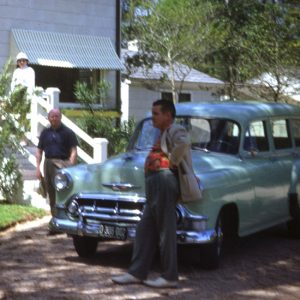
Dad was always on my case.
“You don’t think, kid.” He always called me kid. “You don’t think!”
I could never perform any of the little household chores that he assigned me to his satisfaction. He yelled at me almost every night for something I did wrong.
“Get down here and hang up your goddamn coat!”
I would sulk downstairs to the front hall where he stood steaming with anger, probably after a frustrating day at his office. “How many goddamn times do I have to tell you.
Can’t you do anything right?”
He intimidated my mom, who would become quiet and brooding. My sister hid from him in her room, with her door locked.
Because he disapproved of my many hobbies, when I would hear him come in the door after work in the evenings, I would quickly scoop up all the things that I loved, my stamp collection, coin collection, pictures, comics, and hide them under the bed. If I hadn’t left my coat lying about downstairs, I wouldn’t see him until he came upstairs where the bedrooms were. I would wait in my room in trepidation while I heard him slowly mounting the stairs. First, he would knock on my sister’s bedroom door… where she always locked herself in. Then he would open my door and look in.
“God, what a mess,” he would say, looking around the room filled with my radio station and all of my things. “With all those wires, I am not surprised the goddamn house doesn’t burn down.” If I left a stamp book open inadvertently, he would spot it and then comment, “God, are you looking at those goddamn stamps again. Why don’t you go outside and play ball like other boys?”
Except for the streetcars, these were really my only contacts with my father. It was painful. The house was quiet, stilled, when he came home. We all waited in trepidation for his next outburst. The word ‘love’ was never spoken by any of us. I didn’t know what it meant. “Love” was when a girl kissed a boy on television, or in a movie. That’s all.
I Become My Parent’s Dilemma
My best friend Rob was a brilliant kid, and together we continued to create vast and complex fantasies using our obviously above-normal mental facilities. However, for some strange reason, during the 4th grade, Rob started to become morbidly preoccupied. During recess, we would get together and often he would nervously rub his hands together and talk of mortuaries, dead bodies and embalming fluids. This was disturbing for me. But despite it, we were still fast friends. None of the other boys made any sense to me.
At the beginning of 5th grade, my parents set me down and told me that they were going to send me to public school. A new public grammar school, Carson Elementary, had just been completed nearby, and Mom and Dad had decided to send me there. I was miserable and I cried and begged them to let me stay at Grayland. I think that they wanted to separate me from Rob Wilfley, whom they viewed with considerable consternation.
I detested Carson. I spoke with no children there, and I remained aloof, humming my favorite music on the playground, scrapping the playground chain fence to get a proper percussive sound. After several months of this, they send me back to Grayland.
During the sixth grade at Grayland, I started noticing the girls changing, and I was fascinated. I continued to spend as much time as I could with my friend Rob Wilfley. Neither of us had any interest in sports, and during class sports periods, we sometimes played “TV cameramen,” pretending to film our teammates playing baseball or football.
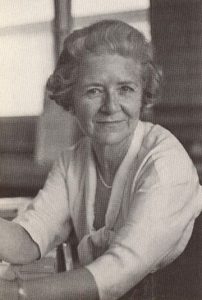
As the sixth grade closed, the lady who was to be my seventh-grade teacher, Mrs. Gorham, invited me to her house to talk with me. It was a serious conversation. She spoke to me like no other person had before, deeply. She told me that she had been waiting for me to arrive at the seventh grade for years. She was a very, very special lady.[1]
But seventh grade at Grayland was not in my cards: My parents separated me from Grayland, and from Rob Wilfley, for good this time. I was sent back to public school, this time to Gove Junior High School. This experience changed my life completely. I became a juvenile delinquent, a role that I hoped would impress the blooming young girls that I was surrounded with. A year later, a new school, Hill Junior High School, opened. It was close to home, and I continued school there.
[1] Later, when I was 16 years old, my Grandmother Robertson, with whom I was very close, sent me to Europe with a group of teenage kids escorted by Mrs. Gorham. That trip provided another life-changing event. I visited Mrs. Gorham years later, not long before she passed on, to tell her how much she had helped me with our talk at Grayland and the months in Europe.
Oh, Oh - Puberty
But back to the piano. I tried playing Granna’s old piano in my basement for years. I had little staff-ruled notebooks in which I wrote little compositions that I tried to compose. But when I reached puberty, I became really confused. I tried changing from an extremely introverted and insecure boy to someone who was worldly and popular with the girls. Kids made fun of classical music, so I denied that I knew anything about it. In the ninth grade, I saved my money and bought a Silvertone electric guitar from Sears & Roebuck. I was going to be like Elvis Presley.
After years of disciplinary problems and being shuffled from one school to another, I somehow graduated from high school in 1960. My parents tried to get me admitted into a college, but that didn’t interest me at all. Since my chances for college acceptance were minimal anyway, due to my history of bad report cards, my father, not knowing what else to do with me, took me to a Navy recruiter. Assuming that I had no other choice, I signed up.
The U.S. Navy
I somehow survived boot camp, returning to Colorado on leave proudly wearing my new “sailor suit.” But when I returned to California for my first Naval assignment aboard the USS Los Angeles, the reality of life came crushing in on me. It was another anvil.
I realized that I was stuck in the U.S. Navy: a “swabie” for the next four years! I couldn’t go where I wanted to go, and I couldn’t be who I wanted to be! This realization was one of the most depressing moments in my life. I can to this day remember standing in my bunkroom aboard ship, realizing for the first time this awful certainty. I didn’t want to be on that ship. I didn’t want to be in the Navy. I didn’t want to be a sailor. I hated it, and yet I had signed up, and here I was, stuck for four long years!
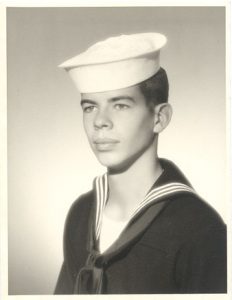
It was then that I came to my senses. Within months, I was listening to classical music again. The ship that I was stationed on was tied up much of the time at the Long Beach, California Naval Yard. I started making trips to the Long Beach Public Library to check out records that I wanted to listen to. I also started reading. I had never really read in my life, being considered a problem reader with a complete lack of concentration during my school years. Now I had discovered books, and I started reading voraciously. It began with Hemingway and Fitzgerald, then I discovered Thomas Wolfe and James Joyce. The music, the books, they became my real life amidst a life I that I hated participating in.
“Moments avant de partir”
I also began studying the guitar seriously. I bought books and learned technique and chords. I had already begun listening to jazz before I joined the Navy, and I loved the music of the great French Gypsy guitarist Django Reinhardt. I became a serious student of music, teaching myself chords, progressions, solos, and learning how to read music.
My self-studies continued. Within a year, I was studying books on music composition, counterpoint, theory, and checking out dozens of classical music scores from the library. I also began writing music again, and I used my guitar to work out my compositions.
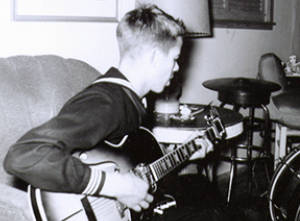
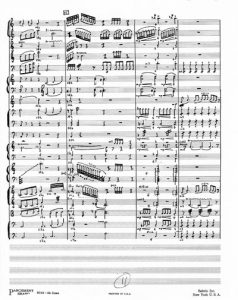
In 1963, I began composing a full-scale symphonic work in four movements called Moments avant de partir, but soon I realized that this was going to be a difficult task using the guitar. The instrument was very limited in its ability to recreate the chords that I needed for my orchestral composition. It was during this period that I decided that I would have to learn the piano in earnest.
There was no piano aboard ship, but there was a harmonium in the ship’s chapel, and the chaplain agreed to let me use it. Also, I had a friend who lived ashore, and she had an old upright that I could use once in a while.
I finished my symphonic work in early 1964. A fellow that I had met knew the conductor of the Long Beach Symphony Orchestra, and he told the conductor about me. The conductor agreed to have the orchestra perform the work for me in rehearsal. I prepared all the parts, and the great night soon arrived. My aunt and my mother and father all flew out for the occasion. I will never forget the experience of hearing my music played by that orchestra!
The Piano Returns
It wasn’t until I was finally released from the Navy in early summer of 1964 that I was able to really begin working at the piano in earnest. My parents still had the old upright that my grandmother had given me in their basement, and that summer I stayed in their home while attending classes at the University of Colorado Extension Division in Denver, studying Italian and French.
I spent hours each day at that old piano, and it was there that I began writing a little Prelude. Somehow it came to me, almost like a vision. Not a visual one, but an aural one. I could hear the music, as I always had been able to do even as a small child, and I felt that it was powerful and wonderful, and I carefully wrote it down.
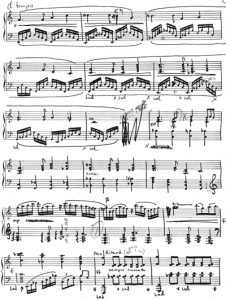
I remember working on this little piece that summer. We took a week’s vacation at the posh Garden of the Gods Country Club in Colorado Springs. Walt Disney was also visiting there during that time, and it was uplifting to actually be able to see this great man. My Navy friend Grant Weyenberg came with me, and we enjoyed talking with the great man on the patio outside the restaurant. When the occasion presented itself during this vacation, I would slip away into one of the rooms of the club where a piano was located. During the day that room was unused, and there I could work on my little Prelude.
In the fall, I moved to Boulder, Colorado to begin studies at the University of Colorado. In addition to my studies, I formed a rock band and continued to develop both my guitar and piano technique. During the first semester, I enrolled in private piano studies. One day, I brought in my little prelude and showed it to my teacher, a graduate student. She looked at it, played a little bit, and dismissed it quickly: “Oh it sounds too Gerswhiny” she said. I was disappointed and figured that I had overestimated my abilities and decided not to bother anyone with it again.[1]
The Contrasts
My studies at the University soon proved to be largely disappointing and unfulfilling. I thought that my music professors were boring and uninspired. I joined a rock band in Boulder, playing lead guitar. After a while, I started my own group, a jazz, rock and R&B trio. I called the group The Contrasts, named after the trio by that name composed by Bela Bartok.
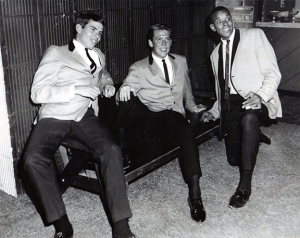
During my second semester at Colorado University, I dropped out, and with the Contrasts, I went to Las Vegas. There we played in the lounges of the Silver Nugget casino. It wasn’t long, however, before I became completely disenchanted with casino life, and I left the band and moved to Los Angeles. There I began studies in earnest, attending classes at the Institute of Ethnomusicology at UCLA. I married Suzie Barr in 1966, and we moved to New York where I enrolled in the extension division of the Julliard School of Music. I was serious about learning music. I rented a piano. But, after my Boulder experience, I never again took piano lessons.
It wasn’t until 1974 that I really began improvising on the piano. This is the story about how that came about:
I Hear New Music in a Dream
One night I had a dream. In this dream I was shown that I would begin playing an entirely new kind of music on the piano. I heard this music clearly in the dream. I awoke with powerful feelings stirring inside of me, and I went downstairs to a old upright piano that a friend had just coincidently loaned me, and I started improvising on the old piano, finding that I was creating music much like I had heard in the dream. I worked on my improvising a little each day. A few weeks later I had another dream where I was shown that no one around me would understand the music that I was playing, and that people would ignore my improvisations. Both dreams came true.
From this point on I continued improvising. I would wait until I was completely alone, then in silence, begin. Perhaps at first, I would begin with kind of a warm-up, but soon, as I continued to play, I would enter into a divine state of consciousness, and I could feel the presence of angelic beings around me.
I never considered telling this to people, especially publicly, as I am now doing here. In fact, at first, I didn’t really consider it anything out of the ordinary. Angels are a reality: I am not the only person that has experienced these divine beings who live amongst us, usually unseen, and so I hope my readers who don’t understand this will not be too skeptical.
When I improvise, I can enter into this same divine state and unfold some particular melodic pattern that I realize I am weaving in and out of the composition in many different ways. The difficult part of improvising like this was always my insecurity when I entered this state while others were in the room, so I rarely, if ever, performed directly for anyone. Also, when I did perform while my wife and three children were in the house, it appeared to me that none of them actually noticed that I was doing anything unusual. Sometimes after playing a magnificent, heaven-sent and unique piece of music, I would go into the kitchen and find my wife in a completely different space, unaware of anything I had played. I was very insecure about all of this.
I felt that what I was creating was magnificent. Not that I was a magnificent musician or composer, but I loved the music that just came out of me spontaneously, and I knew that the music was coming from a higher, divine dimension. After I put together my first recording studio and started recording my first synthesizer albums, I wanted to record these piano improvisations and release an album of them, but I was faced with difficulties. Having my recording studio in my house, it was not always quiet enough to record. Also, I was very particular about the tuning of the piano, and it went out of tune usually within days of being almost perfectly tuned by one of my piano-tuner friends. Additionally, I usually make a few small slip-ups during an improvisation, hitting two keys at once for example, or a wrong key, and these would be very difficult to ‘fix in the mix.’
It wasn’t until 1998, when I built my second recording studio in Richmond, Virginia, that I had the equipment that would allow me to capture my improvisations. For one thing, there were now people around me who could relate to what I was playing, and who would enter into my spiritual space with me. Several times I would improvise upstairs in the house in Richmond, playing a long, beautiful composition, then as the final chord sounded and I let the tones ring away gradually, I would get up and find several people at the foot of the stairs, entranced, resplendent with the love and joy reflected in the music.
I am telling the truth. I am explaining my music as best and as truthfully as I am able to do. For years, many of the people who were around me did not understand my gift. Now as I approach 60 years of age, I know that it is necessary to document my truth. I do this out of respect for what I have been given and to make it easier for others to understand. We are at a critical point, a juncture, in the evolution of our world, and I believe that my music will play an important role in our continued evolution.
One weekend in Richmond, I captured two improvisations. On Sunday night, I recorded Midnight Solitude. The next morning, I improvised Morning Sunrise, just before heading off to work at the Virginia Department of Motor Vehicles.
When I say captured, I mean that I performed the piecesand captured them using the MIDI software running on my computer and then stored these compositions on my hard drive in MIDI format. The beauty is that I could play back the composition that I just improvised, and then correct any small mistakes by changing the MIDI events. Also, I am able to record the finished piano solo, and in the end add any additional parts that I could conceive of, such as choir, woodwinds, timpani, etc.[1]
Thank you for taking a journey with me and my piano.
More about my Father, Donald Robertson Sr. Here
